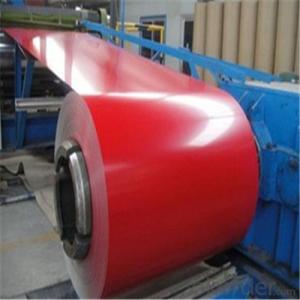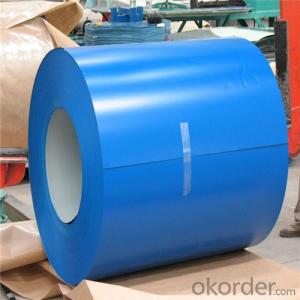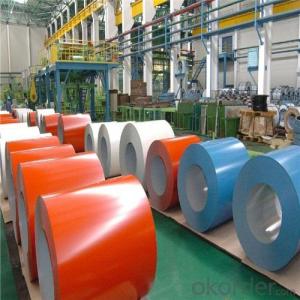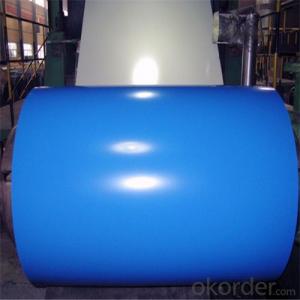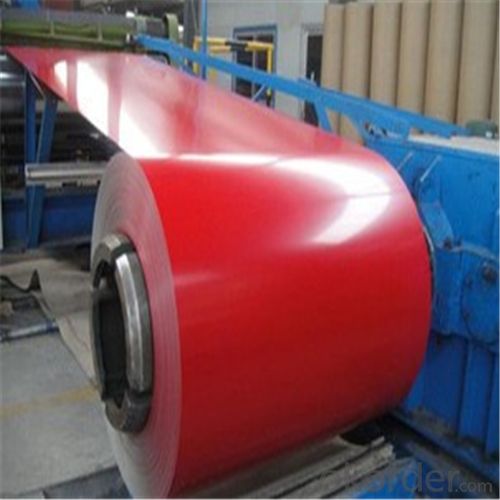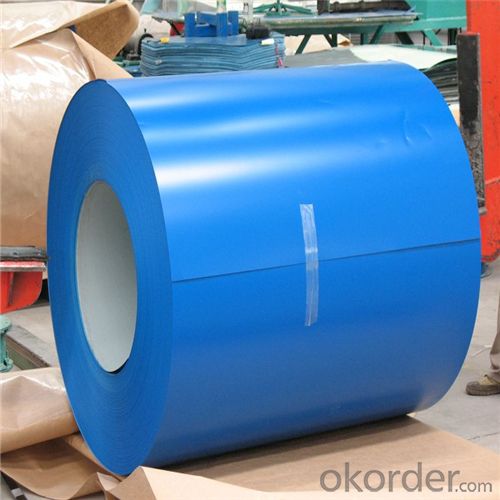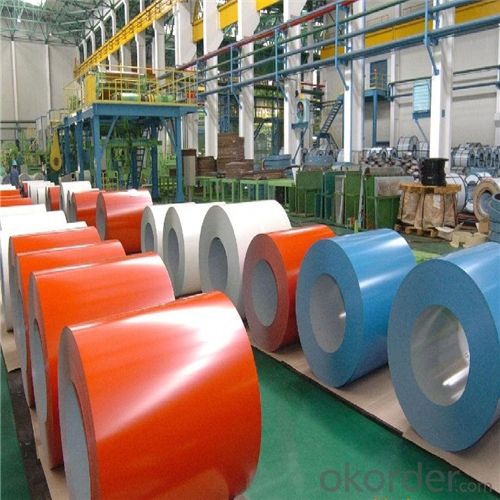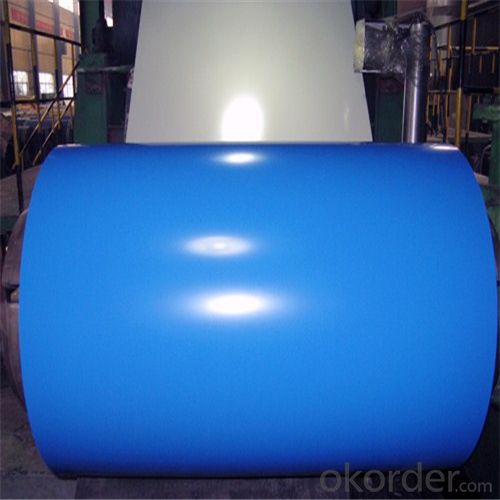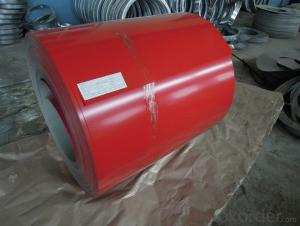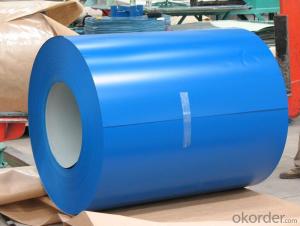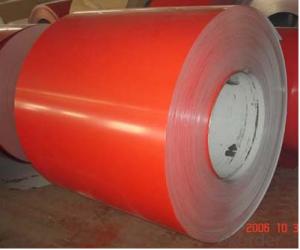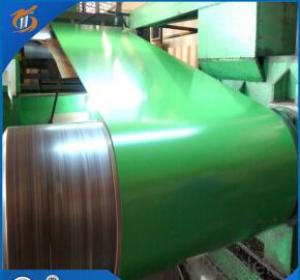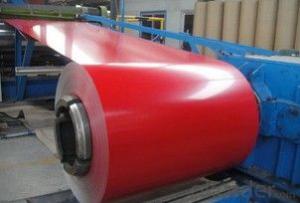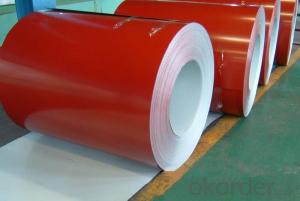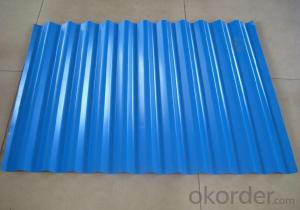Pre-painted Galvanized Steel Coil with High Quality
- Loading Port:
- Tianjin
- Payment Terms:
- TT OR LC
- Min Order Qty:
- 50 m.t.
- Supply Capability:
- 5000 m.t./month
OKorder Service Pledge
OKorder Financial Service
You Might Also Like
Pre-painted Galvanized Steel Coil Used for Industry
1.Structure of Pre-painted Galvanized Steel Coil Description
With GI as base metal, after pretreatement and liquid dope with several layers of color, then after firing and cooling, finally the plate steel is called pre-painted galvanized steel. Pre-painted galvanized steel is good capable of decoration, molding, corrosion resistance. It generally displays superior workability, durability and weather resistance.
2.Main Features of Pre-painted Galvanized Steel Coil
•High Purity
•Easy control and operation
•High strength
•Fast melting
•Competitive price
•Best Service
3. Pre-painted Galvanized Steel Coil Images
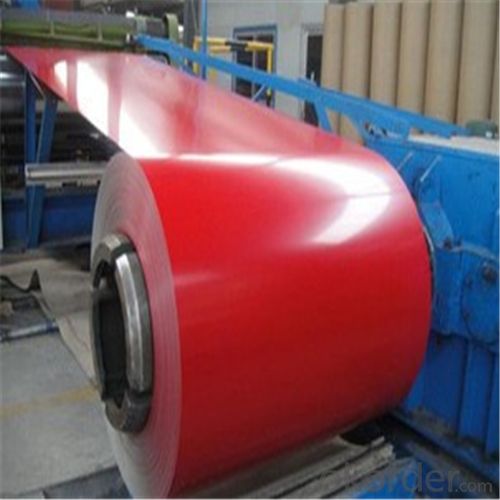
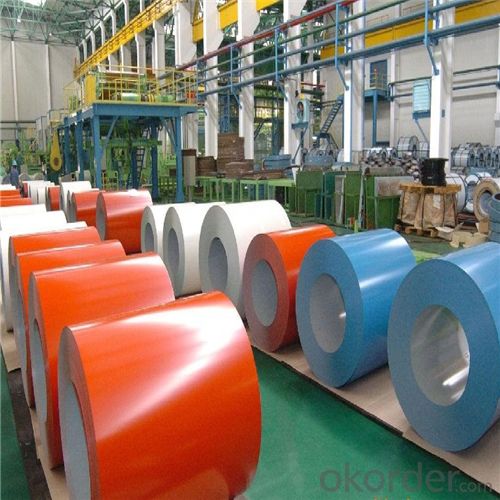
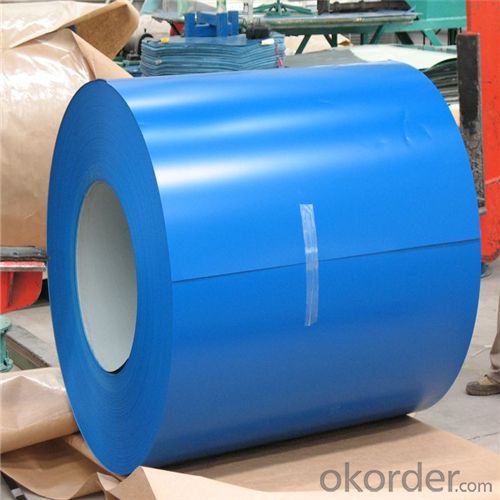
4. Pre-painted Galvanized Steel Coil Specification
Pre-painted Galvanized Steel Coil | |
Thicknenss | 0.18mm-1.5mm |
Width | 900-1250mm |
Coating mass | 30-275g/㎡ |
Paint | PE, PVDF, PU |
Color | RAL Scale |
Coil weight | 3-7mt |
Coil inner diameter | 508 or 610mm |
5.FAQ of Hot-Dip Galvanized Steel Coil
We have organized several common questions for our clients,may help you sincerely:
①How about your company?
A world class manufacturer & supplier of castings forging in carbon steel and alloy steel,is one of the large-scale professional investment casting production bases in China,consisting of both casting foundry forging and machining factory. Annually more than 8000 tons Precision casting and forging parts are exported to markets in Europe,America and Japan. OEM casting and forging service available according to customer’s requirements.
②How to guarantee the quality of the products?
We have established the international advanced quality management system,every link from raw material to final product we have strict quality test;We resolutely put an end to unqualified products flowing into the market. At the same time, we will provide necessary follow-up service assurance.
③How long can we receive the product after purchase?
In the purchase of product within three working days, We will arrange the factory delivery as soon as possible. The pecific time of receiving is related to the state and position of customers.Commonly 7 to 10 working days can be served.
- Q: What are the different types of steel coil loading and unloading devices?
- There are various types of steel coil loading and unloading devices that are commonly used in industrial settings. Some of the main types include coil lifters, coil hooks, coil grabs, and coil transfer carts. These devices are designed to safely and efficiently handle steel coils during the loading and unloading process, ensuring smooth operations and minimizing the risk of accidents or damage to the coils.
- Q: What is the process of slitting steel coils into narrower strips?
- The process of slitting steel coils into narrower strips involves unwinding the steel coil, passing it through a set of rotating circular blades called slitters, and then rewinding the resulting narrower strips onto separate spools.
- Q: How are steel coils inspected for oil or rust residues using chemical analysis?
- Steel coils can be inspected for oil or rust residues using chemical analysis by first collecting samples from various parts of the coil. These samples are then analyzed using appropriate chemical techniques such as solvent extraction or acid digestion to extract any oil or rust residues present. The extracted substances can be further analyzed using methods like Fourier transform infrared spectroscopy (FTIR) or atomic absorption spectroscopy (AAS) to identify and quantify the specific contaminants. This chemical analysis allows for a thorough inspection of steel coils and helps ensure their quality and suitability for various applications.
- Q: is stainless steel a good steel for sensitive skin? or does it have to be surgical or sterling silver?
- Surgical stainless steel 316LVM is good, 316L is nowhere near in quality. Its very unusual for someone to have a reaction to surgical steel. Avoid plain stainless steel. Titanium is better, tougher and lighter. And contains less nickel than surgical steel, pretty close to nothing. Its pretty much impossible to be allergic to good quality titanium. Niobium contains no nickel, but only comes as CBRs, and is pretty expensive and unusual. Silver and gold should be avoid in piercings. They have to mix it with so much other junk so that its strong enough, really high nickel content.
- Q: What are steel coils used for?
- Steel coils are used in a variety of industries for applications such as manufacturing of automobiles, construction materials, appliances, and packaging materials.
- Q: What are the advantages of using steel coils over other materials?
- There are several advantages of using steel coils over other materials. Firstly, steel is highly durable and has a long lifespan, making it ideal for various applications. Secondly, steel coils have excellent strength and can withstand heavy loads and extreme weather conditions. Thirdly, steel is recyclable and environmentally friendly, ensuring sustainability. Additionally, steel coils provide superior corrosion resistance, reducing maintenance costs. Lastly, steel offers versatility in terms of customization, allowing for various shapes, sizes, and thicknesses to meet specific requirements.
- Q: a picture of the atomic structure of carbon steel
- This is actually a quite complex question... The atomic arrangement in steels can be controlled over a pretty wide range of different structures. This is really the fundamental reason why steel is such a commonly used material. The different atomic structures produce different physical properties so metallurgists have developed many different processes to control the atomic structure to get the properties they want. One simple answer is that Fe is BCC, body centered cubic at room temperature at equilibrium conditions. When you heat Fe up, it transforms to FCC, face centered cubic. If you continue heating Fe, it goes back to BCC, then it melts. The addition of C makes these structures (and the transformation temperatures) different. Deviating from equilibrium conditions by, for example, cooling very quickly (quenching) creates different atomic structures (one of the most important is known as martensite). Depending on how much C is in the steel, you can also have two different atomic structures (two different phases) present in equilibirum, for example, pearlite which is a mix of alpha Fe (BCC) and iron carbide Fe3C (orthorombic crystal structure). So... you need to think a little more about exactly what you want a picture of. I hope this helps
- Q: How are steel coils used in the production of electrical equipment?
- Steel coils are commonly used in the production of electrical equipment as cores for transformers and inductors. The coils are wound around a steel core to create a magnetic field that allows for efficient energy transfer and voltage regulation. Additionally, steel coils are used in the construction of electric motors, generators, and other electrical components to enhance their performance and durability.
- Q: What are the common quality issues with steel coils?
- Some common quality issues with steel coils include: 1. Surface defects: Steel coils may have surface defects such as scratches, pits, or rust spots. These defects can affect the appearance and smoothness of the final product and may also impact its performance. 2. Dimensional variations: Steel coils may exhibit dimensional variations, such as thickness variations, width variations, or length variations. These variations can lead to difficulties in processing the steel and may result in inconsistent product dimensions. 3. Mechanical properties: Steel coils may have variations in mechanical properties such as yield strength, tensile strength, or hardness. These variations can affect the strength and durability of the final product and may also impact its suitability for specific applications. 4. Coating issues: Steel coils that are coated or galvanized may experience issues with the coating, such as uneven coverage, peeling, or adhesion problems. These coating issues can result in reduced corrosion resistance and compromised aesthetics. 5. Internal defects: Steel coils may have internal defects such as inclusions, voids, or segregations. These defects can weaken the steel and may lead to failure or breakage during processing or use. 6. Edge issues: Steel coils may have edge defects, such as burrs, cracks, or uneven edges. These edge issues can affect the handling and processing of the steel and may also lead to problems during fabrication or assembly. 7. Coil set or camber: Steel coils may exhibit coil set or camber, which refers to the curvature or bowing of the coil. This can result in difficulties during processing and may lead to distorted or misaligned products. To ensure the quality of steel coils, manufacturers employ various quality control measures such as rigorous inspection, testing, and adherence to industry standards and specifications.
- Q: Can steel coils be stamped?
- Yes, steel coils can be stamped. Stamping is a common manufacturing process used to shape and cut steel coils into desired forms and designs.
Send your message to us
Pre-painted Galvanized Steel Coil with High Quality
- Loading Port:
- Tianjin
- Payment Terms:
- TT OR LC
- Min Order Qty:
- 50 m.t.
- Supply Capability:
- 5000 m.t./month
OKorder Service Pledge
OKorder Financial Service
Similar products
Hot products
Hot Searches
Related keywords
